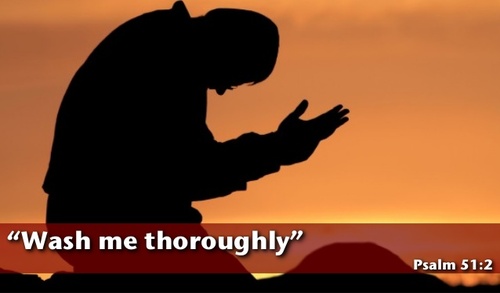 “‘Father, I have sinned against heaven, and before you.’” Luke 15:18
“‘Father, I have sinned against heaven, and before you.’” Luke 15:18
The Prodigal Son represents the quintessential story of a young man gone wrong. The operative question, however, is when did his failed life turn around? At his assertiveness? “Give me my portion.” At his awakening? “When he came to himself.” At his his decision? “I will arise and go.” At his action? “And he arose.” No, none of these. The success of the prodigal happened when he uttered the three words most difficult for anyone to speak: “I have sinned.”
The three sweetest words are, “I love you.” Three hard words are, “I was wrong.” The three hardest words, “I have sinned.” The Apostle John said, “If we say that we have not sinned, we make him a liar, and his word is not in us.” 1 John 1:10.
Admit that you have sins to confess. “For all have sinned and come short of the glory of God.” Romans 3:23. “For there is not a just man on earth, that does good, and does not sin.” Ecclesiastes 7:20. “And He has quickened you who were dead in trespasses and sins.” Ephesians 2:1.
“The heart is deceitful above all things, and desperately wicked: who can know it?” Jeremiah 17:8-9. A person’s conscience testifies against him or her. The story is told of a teen girl who had a baby but suffered so much mental anguish that she killed it. Afterwards, she rejected any help because she said she could still hear the baby screaming.
The Bible tells the story of sinners. Pharaoh was hardened in his sins because his confessions were not sincere. Balaam wavered in his sins in that he was convicted in emotional moment, but went back on his word. Achan sinned late, succumbing to temptation after Israel’s mighty victory. His act wiped out years of service and his entire family reaped the penalty. The Prodigal Son sinned early. Some insist that they have the right to sow their wild oats. Too many are hopeless addicts or alcoholics today because they gave in to youthful urges or passions.
Why is it so hard to say, “I have sinned?” Some people are ignorant of sin. When you hear truth, you must respond. Pride of life is deeply ingrained in the fallen human nature. This causes some to refuse to place themselves in a bad light or suffer embarrassment. Some are simply stubborn. They have no reason to confess other than they just don’t want to. Some harbor a fear of discovery. “And this is the condemnation, that the light has come into the world, and men loved darkness rather than light, because their deeds were evil.” John 3:19.
The three words “I have sinned,” call heaven to attention. Not, “Look how good I’ve been,” or, “Look how much money I’ve given,” or, “Look at the great sacrifice I have made for you,” or, “Look at my great successes in life,” or “Look at the wonderful works I’ve done.” But, as unlikely as it may seem, the words “I have sinned” transform failure into success. “And he arose and came to his father. But when he was still a great way off, his father saw him and had compassion, and ran and fell on his neck and kissed him. And the son said to him, ‘Father, I have sinned against heaven and in your sight, and am no longer worthy to be called your son.’ But the father said to his servants, ‘Bring out the best robe and put it on him, and put a ring on his hand and sandals on his feet. And bring the fatted calf here and kill it, and let us eat and be merry; for this my son was dead and is alive again; he was lost and is found.’ And they began to be merry.” Luke 15:20-24.
It is not your pride, but your humility; not your self-exaltation, but your self-deprecation; not your assertiveness, but your subservience that turns your life around.